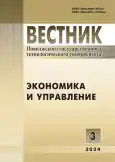Воспроизводство интеллектуального капитала индивидов в отечественной экономике: основные этапы и тенденции
- Авторы: Сафиуллин Н.З.1, Фаттахов Т.В.1
-
Учреждения:
- Казанский (Приволжский) федеральный университет
- Выпуск: № 3 (2024)
- Страницы: 6-17
- Раздел: ЭКОНОМИЧЕСКАЯ ТЕОРИЯ
- URL: https://journal-vniispk.ru/2306-2800/article/view/282030
- DOI: https://doi.org/10.25686/2306-2800.2024.3.6
- EDN: https://elibrary.ru/LBCDKI
- ID: 282030
Цитировать
Полный текст
Аннотация
Введение. В экономике Российской Федерации для процессов воспроизводства интеллектуального капитала граждан характерны разнонаправленные тенденции. С одной стороны, достаточно активно развиваются системы дополнительного, в т. ч. дистанционного, образования, совершенствуется инновационная инфраструктура, интенсивно создаются и совершенствуются площадки поддержки стартапов – одной из форм реализации интеллектуального капитала и т. п. С другой стороны, неоднозначное влияние на качество воспроизводства интеллектуального капитала оказывают институт ЕГЭ, Болонская система подготовки кадров, отток части наиболее квалифицированных кадров, в частности IT-специалистов, в виртуальный сегмент экономики.
Цель работы – формирование методического инструментария оценки интеллектуального капитала и обоснование направлений совершенствования его воспроизводства в условиях формирования постиндустриальных социально-экономических решений.
Методология. Теоретической базой исследования стали положения институциональной, неоинституциональной и постнеоклассической парадигм экономической теории в части изучения тенденций формирования и воспроизводства интеллектуального капитала. При написании работы использованы такие методы, как анализ, синтез, исследование статических и динамических показателей, корреляционно-регрессионный анализ, инструментарий портфельного подхода к исследованию экономических процессов, индексный метод.
Результаты исследования. Систематизировано содержание основных этапов развития процессов воспроизводства интеллектуального капитала индивидов в отечественной экономике с советского периода до начала 2020 года. Так, во времена СССР сложилась достаточно комплексная и эффективная система воспроизводства интеллектуального потенциала занятого населения. Такая система была разрушена в 1990-х годах. Авторами выделены основные тенденции, достоинства и недостатки воспроизводства интеллектуального капитала на различных этапах эволюции отечественной экономической системы в 2000–2024 годах, в том числе связанные с внедрением в Российской Федерации новых институтов: ЕГЭ, Болонская образовательная система, институты инновационной инфраструктуры и др.
Выводы. Проведённое исследование подтверждает теснейшую взаимосвязь воспроизводства интеллектуального капитала индивида с процессами трансформации отечественной экономики. Имеет место синхронизация этапов развития интеллектуального капитала с институциональными реформами социальной и экономической систем общественного воспроизводства.
Ключевые слова
Полный текст
Об авторах
Наиль Закирович Сафиуллин
Казанский (Приволжский) федеральный университет
Автор, ответственный за переписку.
Email: NZSafiullin@ksu.ru
SPIN-код: 4931-1501
доктор экономических наук, профессор, Институт управления, экономики и финансов
Россия, 420008, Казань, ул. Кремлевская, 18Тимур Василевич Фаттахов
Казанский (Приволжский) федеральный университет
Email: NZSafiullin@ksu.ru
SPIN-код: 1936-2963
аспирант кафедры экономической теории и эконометрики, Институт управления, экономики и финансов
Россия, 420008, Казань, ул. Кремлевская, 18Список литературы
- Валишин Ф. Т. Проблема начала и cтратегия динамизма. Москва: Энциклопедист-Максимум, 2020. 179 с.
- Шинкевич А. И., Кудрявцева С. С., Шинкевич М. В. Институциональное обеспечение накопления интеллектуального капитала в экономике знаний: монография. Казань: Изд-во КНИТУ, 2012. 284 с.
- Клейнер Г. Б. Стратегия предприятия. Москва: Дело, 2016. 568 с.
- Супрун В. А. Интеллектуальный капитал: главный фактор конкурентоспособности экономики в XXI в.: монография. Москва: Ленард, 2016. 200 с.
- Российская экономика: проблемы и перспективы. Москва: Изд-во Института экономической политики, 2024. 456 с.
- Качество образования, эффективность, НИОКР и экономический рост: количественный анализ и математическое моделирование: монография / В. А. Садовничий, А. А. Акаев, А. В. Ко¬ротаев, С. Ю. Малков. Москва: Ленанд, 2016. 352 с.
- Василенко Н. В., Линьков А. Я. Экономика образования. Москва: Инфра-М, 2017. 304 с.
- Исаев Г. Н. Предпринимательство в информационной сфере. Москва: КноРус, 2023. 286 с.
- Родионов Е. Б. Роль и значение интеллектуального предпринимательства в инновационном развитии территорий // Проблемы маркетинга и менеджмента. 2020. №4. С. 71–72.
- Городкова С. Р. Креативная экономика // Молодой ученый. 2023. № 18 (465). С. 86–88. EDN: DAWFQB
- Креативный менеджмент / А. М. Афонин, Ю. Н. Царегородцев, В. Е. Афонина, О. Э. Башина. Москва: Форум, 2019. 272 с.
Дополнительные файлы










